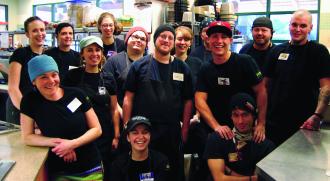What Would Increased Happiness Do for Your Business?



Businesses often forget about the culture, and ultimately they suffer for it because you can’t deliver good service from unhappy employees.” Tony Hsieh, CEO of Zappos
How would your co-op employees like a beautiful, private outdoor break space? Classes on bicycle maintenance and repair? Free yoga? These are just a taste of what came from the Ashland Food Cooperative’s groundbreaking Happiness@Work project, conceived in 2013.
The Ashland Food Co-op is southern Oregon’s first and only certified- organic retailer. It started in 1971 and has grown into a well-respected, full-service grocery with more than 10,000 owners. In 2015, the co-op topped $30 million in sales.
A return to mission and vision
The Happiness@Work project was born out of tension created around whether or not to unionize. As the issue was resolved and the employees created their own union, the co-op’s leadership felt it was time to realign with the co-op’s mission and vision: “joyfully working together, providing a workplace that fosters opportunities for participation, empowerment and growth in an environment of mutual respect and cooperation.”
The Ashland Food Co-op created a Happiness@Work Team, comprised of board members, the general manager, and representatives from the newly formed employee alliance. After reviewing several proposals from consultants, the co-op selected Capiche for the project.
Known for its focus on workplace culture and happiness at work, Capiche applied scientific research on happiness to the co-op’s real-world situation. “It has been fun to see where the theory starts to impact the actual workings, the mechanics of the organization,” says the co-op’s general manager, Emile Amarotico.
The Capiche team started with an organizational assessment from Happiness Works* and then created opportunities for employees at all levels to provide suggestions using an appreciative inquiry process. At an all-store meeting, they gathered information about what employees valued most about their work at the co-op and discovered areas that offered opportunities for improvement. The key questions they asked were:
1. What changes would make the Ashland Food Co-op an even better place to work?
2. What ways could you contribute toward making positive changes?
3. What is the best part about being an employee at the Ashland Food Co-op?
Between the Happiness Works assessment and the appreciative inquiry process, several key themes emerged: communication and cooperation, learning and development, and renewal and stress management.
Three themes, three teams
With this information from the assessment and inquiry, the Happiness@Work Team empowered three volunteer solutions teams (comingling managers and employees from various departments) to create and develop solutions around these key topics, with the vision of making the co-op a better place to work. These groups met for five months and, in the process of focusing on growth opportunities, also developed strong cross-department and cross-employment-level relationships. This promoted greater understanding and empathy among all involved.
Each of the three solutions teams developed detailed proposals for positive change, which they presented to the board of directors and management team. Each team had several initiatives that were approved and implemented.
Communication and cooperation team: “Daily huddles” in each department (1¬5 minutes) so all workers understand the concerns or focus of the day; semi-annual all-employee meetings—two times on two consecutive days, to encourage participation; new online portal where employees can access their handbook and benefits information, bargaining agreements, time and pay records, and forms.
Renewal and stress management team: Enhanced employee space: a completely enclosed outside break area with a patio, gardens, picnic tables, lawn chairs, and secured bike parking for employees—plans to improve the indoor break area are in the works; increased staffing; formal staffing plan for each department, shared with staff, regarding priorities for when staffing is inadequate. This alleviates stress by narrowing the department work for the day to core functions—in other words, not everything is expected to get done when the department is lacking the appropriate staffing level.
Learning and development team: The vision of this team was to establish a “Co-op University” with three types of classes: required work-related, voluntary work-related, and life enriching. All employees are given six hours per year to use for courses of their choice. Employees are paid for time spent in courses that are required. Classes are offered online and in person; examples include “How to Make Your Own Organic Cleaning Products,” a training track for employees wanting to become supervisors, and an appreciation course for each department’s products.
The classes’ logistics are tracked using the training platform developed by National Co+op Grocers.
The Happiness@Work project today
“The Happiness@Work project has been a great process for the organization,” said Sharon Van Duker, human resources manager at Ashland Food Cooperative. “It has taken us from a time where we were struggling with union debates to bringing employees together. Seeing the concrete results from the solutions teams shows that management listens to employees.”
Today there is an employee solutions steering committee—and new solutions teams are formed to address needs as they arise. For example, there are several teams looking at ways to improve customer service. Current participation includes 25 employees and 10 managers.
General Manager Amarotico says, “This work has had a positive impact on employee engagement. By implementing solutions they’ve designed, employees enliven the entire organization. It’s great that we’re making strides toward a happy workplace and have solutions being designed and implemented. The key take-away is that the results will include more productivity, happier customers, and an atmosphere with a vibe that more people want to participate in.”
Amarotico adds, “I would recommend Capiche to any organization that is truly committed to engaging with the nerve system of their organization with the intention of creating positive change.”
Happiness and wellbeing at work are possible wherever people are clear about and honor their values, vision, and mission. Employee and customer loyalty, creativity, innovation, teamwork, and ultimately positive business results follow employee happiness and engagement.
Chris Cook is the principal of Capiche and works with businesses on branding, culture, and coaching.







